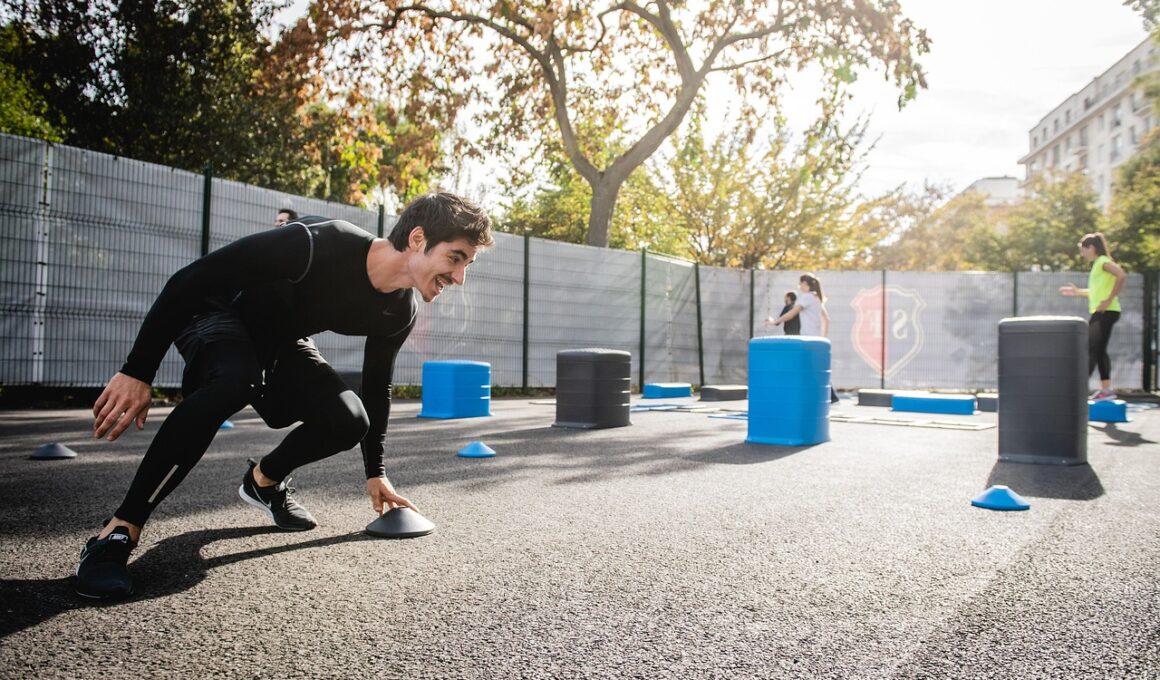The Role of Hydration in Outdoor Cardio Performance
Hydration plays a crucial role in outdoor cardio workouts, influencing both performance and safety. When engaging in physical activities such as running, cycling, or brisk walking outdoors, the body’s water requirements significantly increase. Dehydration can lead to various issues, including fatigue, dizziness, and muscle cramps, all of which can impede performance. Proper hydration helps maintain blood volume, regulates body temperature, and aids in the delivery of nutrients to muscles. Athlete hydration strategies often suggest starting with hydration before the workout and continuing to replenish fluids during and after exercise. Strategies to ensure adequate hydration include carrying water bottles, electrolyte drinks, or hydration packs when outdoors. Set hydration reminders during long sessions and monitor fluid intake as temperatures rise. Consuming fluids at regular intervals instills a habit that improves overall performance. Furthermore, studies indicate that drinking water enhances endurance, increases energy levels, and supports recovery. Outdoor cardio enthusiasts must prioritize hydration to maximize performance and enjoy workouts safely and effectively, enabling them to push their limits during every session without succumbing to the adverse effects of dehydration. Staying hydrated leads to improved outdoor fitness endeavors.
To understand the significance of hydration, consider that our bodies consist of approximately 60% water. Maintaining this level is essential, especially during workouts under the sun. When sweat evaporates, the body loses fluids, making it vital to replace those lost fluids through drinking. Notably, the rate of fluid loss varies based on factors like exercise intensity, environmental conditions, and individual sweat rates. In hot weather, a person may sweat significantly more, necessitating higher fluid intake. This proactive hydration approach prevents discomfort and risk of heat-related illnesses, like heat exhaustion or heat stroke. Carrying a refillable water bottle during outdoor workouts ensures access to hydration whenever necessary. Additionally, incorporating sports drinks with electrolytes is beneficial for long-duration workouts, as they help replace lost salts and minerals. A good practice includes sipping fluids regularly rather than chugging large amounts at once. Pre-workout hydration is equally important; drinking water before exercise prepares the body for the intensity ahead. Always pay attention to your body’s signals, as thirst is a clear indicator that hydration is needed. By adopting these hydration habits, outdoor cardio enthusiasts can enhance their overall performance significantly.
Signs of Dehydration
Recognizing the signs of dehydration is essential for outdoor cardio performance. Symptoms can vary from mild to severe and knowing them helps prevent adverse outcomes. Common signs include persistent thirst, dry mouth, fatigue, and decreased urine output. As dehydration progresses, symptoms may escalate to headaches, dizziness, and confusion. In severe cases, it can lead to heat exhaustion, characterized by heavy sweating, weakness, clammy skin, and rapid pulse. Understanding these indicators enables athletes to act before the situation worsens. Develop a routine for hydration and monitor how you feel throughout the workout. Outdoor enthusiasts often underestimate their fluid needs, particularly in cooler temperatures when thirst signals may be muted. Regularly scheduled drinking routines are helpful in overcoming this challenge. Additionally, awareness of one’s environment—such as high humidity or altitude—contributes to understanding hydric needs during exercise. In conditions with increased heat or altitude, ensure to increase fluid intake accordingly. Optimal hydration practices mitigate risks and enhance athletic capability while outdoor cardio performance maximizes. Choose a reliable hydration strategy to accurately match your workout demands and take your outdoor performance to the next level of readiness.
Incorporating hydration into your workout routine can greatly enhance outdoor cardio performance. One effective strategy is to consume water or electrolytes before starting your workout. Aim to drink around 16-20 ounces of fluids about two hours before exercising to allow your body to absorb the liquids effectively. Additionally, during longer sessions that last more than an hour, aim to drink around 7-10 ounces of water or a sports drink every 10-20 minutes. This consistent intake helps to replace fluids lost through sweat and maintain optimal hydration levels. Post-workout hydration is equally important; consuming fluids immediately after exercise assists in recovery by preventing dehydration while replenishing essential lost nutrients. Including foods with high water content, such as fruits and vegetables, can also contribute positively to overall hydration. Moreover, monitoring your urine color can serve as an effective hydration gauge. Ideally, it should be light yellow, signaling adequate hydration. Such practices develop strong hydration habits, essential for outdoor cardio endeavors. Ultimately, enhancing hydration strategies leads to longer and more enjoyable workouts, promoting healthier lifestyles for outdoor fitness enthusiasts embracing their passion for staying active.
Hydration Strategy Tips
Creating a tailored hydration strategy for outdoor workouts is critical for sustainability and performance. Begin by assessing personal fluid loss through sweat tests to understand individual needs. On a particularly hot day, increase fluid intake; pay attention to how your body responds. Guidance suggests starting workouts hydrated by drinking adequate amounts of water early on. Experiment with electrolyte drinks during workouts exceeding an hour, as they provide essential salts lost in sweat. Proper planning involves preparing hydration schedules based on environmental factors and workout intensities, altering the strategy as conditions change. During high-intensity sessions, consider carrying fluids instead of relying on water stations. Hydration packs or belts can be excellent options for maintaining accessibility. Additionally, factor hydration habits into rest periods; several studies indicate that even short breaks are beneficial for integrating fluid intake. Encourage friends and workout partners to adopt similar hydration plans to promote motivation. Create a habit of frequent sipping rather than large gulps, which could lead to discomfort. Engaging in proper hydration strategies reinforces good practices and ensures outdoor fitness is both effective and enjoyable, fostering growth and performance improvements on every run.
Exploring the impact of hydration on outdoor cardio performance requires recognition of individual differences. Each person’s hydration needs vary greatly, influenced by age, gender, climate, and physical fitness levels. Consider consulting a professional dietitian or sports specialist for personalized hydration plans tailored to your unique body requirements. For outdoor workouts in varying climates, understanding local weather conditions can offer insight into adjusted hydration plans. Evaluating factors such as temperature, wind, and humidity assists athletes in preparing for workouts. Hydration techniques and practices should evolve over time as athletes physically adapt and improve fitness. Maintaining an awareness of these changes ensures hydration plans remain suitable and effective. Keep a fluid log to document daily intake, which helps illuminate patterns in hydration habits. For improved performance, focus on finding balance—proper hydration enhances energy and stamina while mitigating fatigue. Remember to listen to your body; it often provides cues for necessary adjustments. Incorporating flexibility into your hydration approach allows for more play in workouts. Ultimately, the goal is achieving peak performance with essential hydration support so you can enjoy your outdoor adventures to the fullest.
Conclusion
By understanding the critical role of hydration in outdoor cardio performance, athletes can considerably enhance their workouts. Prioritizing hydration prevents dehydration and heat-related illnesses while improving overall endurance and energy levels. Implementing practical hydration strategies, testing individualized fluid requirements, and maintaining consistent intake habits are essential for success during outdoor workouts. Utilize innovative hydration tools like bottles, packs, and smart reminders to keep fluids at the forefront of your routine. Ultimately, stay attuned to personal hydration indicators, assess environmental factors, and continually refine your hydration approach. Adopting an informed mindset toward hydration ensures maximum performance and enjoyment across diverse outdoor fitness activities. Remember, hydration is not merely an afterthought; it is a fundamental cornerstone of successful outdoor cardio workouts. Make hydration a priority, and elevate your outdoor fitness experiences while promoting health, fitness, and readiness. Stay inspired, share hydration tips with fellow outdoor enthusiasts, and motivate one another to reach new performance levels. Embrace outdoor cardio with confidence, knowing that adequate hydration leads to better results and a more enjoyable exercise experience, ultimately driving you toward achieving your fitness goals.
Becoming an informed athlete about hydration strategies promotes longevity in outdoor activities. As you become more mindful of your hydration needs, your overall performance drastically improves. Whether running marathons or simply enjoying nature walks, remember to hydrate effectively. With the knowledge shared in this article, take your outdoor cardio workouts to new heights while avoiding dehydration pitfalls. A societal move toward better hydration awareness will benefit all fitness enthusiasts aiming for optimal performance. It’s crucial to build these habits sustainably into your routines, ensuring that they yield positive long-term results as part of enhancing your outdoor fitness journey. By sharing knowledge with others, the increase in hydration awareness will empower everyone to stay active, healthy, and capable of meeting challenges head-on. Let hydration be an ally instead of a foe, supporting your aspirations and adventures through fitness. Above all, lead by example and inspire others to take hydration seriously; encourage a community where everyone feels empowered to engage in outdoor activities while conscious of their health and performance. Manifest the outdoor experience you crave while fully embracing the joys of cardio exercise. Discover what works best for you in your routine!


